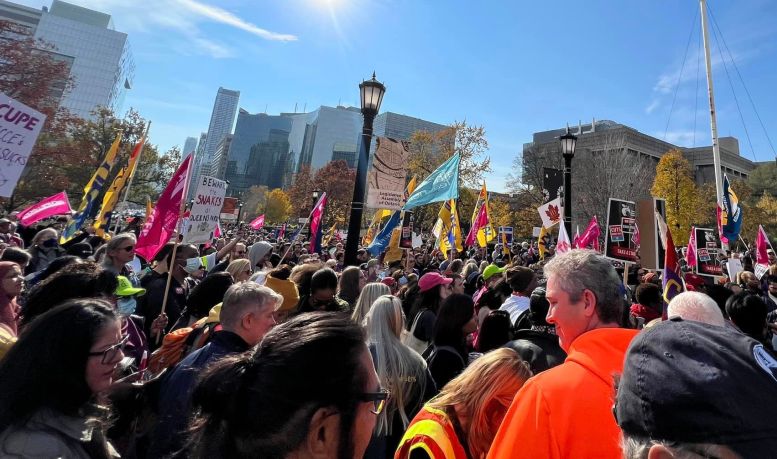Written by Socialist Alternative members in Ontario.
But The Fight Is Not Over Yet
In one week, Ontario’s Conservative government went from an all-out attack on union rights to backing down.
Monday, November 7 was a dramatic day in Ontario’s CUPE strike. In the morning, Premier Doug Ford’s press conference indicated he would be willing to withdraw the back-to-work legislation if CUPE called off its strike and resumed bargaining. Most people knew that Ford had blinked. Ford backed down from his position in only a few days. When CUPE and other labour leaders held their presser, that view was confirmed. The CUPE leaders were delighted with the news coming from the government side, chanting in unison “So-So-So Solidarity.”
The workers of CUPE, and the supporting unions and organizations, forced the Ford government to concede the repeal of Bill 28. This imposed a below-inflation contract on workers and declared their strike illegal. Too often, both federal and provincial governments in Canada have imposed back-to-work legislation, overriding workers’ democratic rights, guaranteed in theory under the Canadian Charter of Rights and Freedoms, and confirmed by the Supreme Court. Too often, the unions retreat under this threat, accepting the legislation. This time CUPE, with support from other unions, stood firm.
This shows the power of the working class and a united labour movement. Specifically, the threat of a general strike and the willingness of other unions to support a general strike spooked the Ford government. But it was a mistake for CUPE to call off the strike so soon. True, Ford has agreed to rescind the legislation but is CUPE now in a better position at the bargaining table? CUPE workers have no reason to trust the Ford government or give it any benefit of the doubt after they so brazenly attacked their democratic rights. The movement had momentum and widespread public support. It’s clear that had the strike gone ahead, the union would have been able to win further concessions from the government. Certainly, they can resume strike action after giving five days’ notice, but the momentum developed over the last week has been interrupted and it may be difficult to regain it.
The General Strike
Before Ford’s announcement, CUPE’s news conference was scheduled to see representatives from the Canadian Labour Congress, the Ontario Federation of Labour and leaders of other private and public sector unions discuss the growing mobilization of the labour movement against the Ford government’s Bill 28. Two separate union sources confirmed to CityNews that at this news conference, there would be “a call for a general strike in Ontario beginning in a week, on November 14. Sources say multiple unions are on board, and there will be escalating job action in the lead-up to a possible general strike.” Over the weekend, there were announcements of significant donations to CUPE from UNIFOR of $100,000 and the BC Teachers’ Federation of $1 million. There were messages of support from Quebec’s union federations CSQ and FTQ. News of these would have been a tremendous morale booster to the striking workers, knowing that the union’s war chest was swelling.
After Friday’s massive protests at Queen’s Park (the provincial legislature) and at MPPs’ offices, the movement didn’t let up over the weekend. There were hundreds of demonstrations and rallies in support of CUPE across Ontario. It was obvious that the majority of the public supported the education workers. There were more big protests in Toronto, others were semi-impromptu actions including one organized by an author of this article. From his Facebook post:
“So if you’ve been following things, you’ll know that there’s a significant strike of Ontario education workers (CUPE) taking place right now. Yesterday, I got an email from the Ontario Federation of Labour, calling for workers to engage in solidarity actions with CUPE. Namely ‘Pick a busy intersection in your community or another highly visible location where there is a lot of pedestrian traffic. Show up from 12PM – 1PM. Bring banners, placards.’ We live close to a busy intersection, so I thought why not try it? I sent a message to our condo Facebook group announcing the plan. There were 6 of us who showed up. Not bad for the amount of work involved. Lots of honking of horns and thumbs up. It felt pretty good.”
The Public Supports the Workers
According to an Abacus poll, conducted on November 4 and 5, 62 percent of Ontarians believe the Conservative government is to blame for the school closures. Among parents with school children, the blame is even higher with 68 percent saying the Ford government is responsible. People overwhelmingly, 70 percent, want the government “to negotiate a fair deal with education workers,” rather than continuing to impose a below-inflation pay deal and attacking the right to strike. “One reason why Ontarians want the provincial government to negotiate a fair deal with education workers is because about half think they don’t make enough money,” the CEO of the research firm said.
Alarmingly for the Ford government, but indicative of the mood in Ontario, the poll also found that “almost half of Ontarians support other unions walking off the job to protest the handling of negotiations by the Ford government.” There is solid support for sympathy strikes and even some form of a province-wide general strike.
The Fight Isn’t Over – Opportunity for a Real Victory
CUPE, having called off their strike action, is now relying on “normal” negotiations with the government. Except that there is nothing ordinary about this government, especially in dealing with workers fairly. Prior to the strike, the union had already reduced its wage demand from 11.7 percent to 6 percent, which Ford rejected. It could well happen that Ford offers something in the range of 3 to 4 percent. If such an “offer” is put to a vote of the CUPE membership, it should be rejected, and the members should tell the union leadership that they should fight for more.
Despite the CUPE leadership calling off the action and the slowing down of the momentum, there is still the possibility of a positive outcome. Regular communication with the union membership about the status of negotiations is vitally important as is pushing for a new strike date when the government comes in with its miserable offer. If Ford makes a below inflation offer, CUPE should build on the good will of the broader labour movement and society, with a mobilization for sympathy strikes leading to a 24-hour general strike.
The pay agreement that CUPE reaches will be used as the standard for all the other public sector workers in Ontario, so this is a fight for all workers and requires united mobilization, solidarity and coordinated action (unlike what happened in BC).
The education workers have established a good case and public opinion is behind them. There is still an opportunity to take the movement forward. Success would be a shot in the arm for the CUPE workers, Ontario workers and the entire Canadian labour movement.



